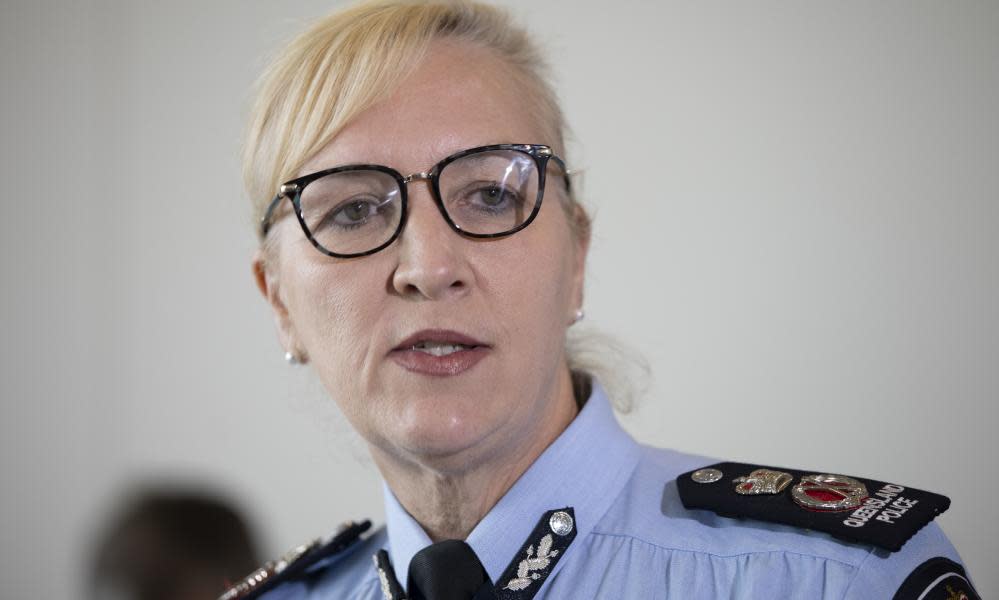Women’s advocates demand royal commission into ‘cultural issues’ in Queensland police

A commission of inquiry into the state’s police service was a key recommendation of the landmark McMurdo report on women’s safety
Women’s advocates say the Queensland government must back a royal commission into “widespread cultural issues” within the Queensland police service, or risk undermining the work of the state’s landmark women’s safety and justice taskforce.
The commission of inquiry was a key recommendation of the taskforce, headed by former court of appeal president Margaret McMurdo, whose first report was released on Thursday.
And it looms as a key test for the government, which welcomed the report but notably stopped short of accepting its recommendations outright.
The police commissioner, Katarina Carroll, and the politically influential Queensland Police Union of Employees, have both rejected the need for an inquiry.
Related: Coercive control should be criminalised in Queensland, taskforce says
Union president Ian Leavers said the report was “another woke, out-of-touch report by a retired judge that overreaches where it pertains to police”.
The McMurdo report recommended the criminalisation of coercive control, but noted that such a move could not occur without widespread education and institutional reform.
In particular the taskforce singled out the police response, which it said had “emboldened” domestic violence perpetrators.
Julie Sarkozi from the Women’s Legal Service Queensland said the recommendation for a commission of inquiry was “key to the success of the report and the outcomes therein”.
“(The taskforce) has said that (reforming police culture) is a priority and is part of what we need to change and monitor if we expect to address domestic violence and the needless deaths of women and children,” Sarkozi said.
Research shows police routinely misidentify victims as perpetrators. In that environment, moves to criminalise coercive control have met with significant opposition from some women’s advocates – particularly First Nations women – who argue they could cause further harm, rather than help.
The Queensland government has previously rejected attempts by the Women’s Legal Service and others to better examine how police culture contributes to poor outcomes for domestic and sexual abuse victims.
The concern now is that the government may pursue criminalisation but without holding an inquiry, given the political sway of the QPS and the officers’ union.
“(Rejecting the recommendation for an inquiry) would be very very concerning,” Sarkozi said.
“There’s a real danger that issues such as misidentification of victims, particularly vulnerable people, in our community would become more extreme.
“We would encourage and support the minister enacting all of these recommendations as soon as possible and note that (the inquiry into police culture) is really key to the success of the report.”
Guardian Australia has written extensively about police failures related to domestic and sexual abuse victims in Queensland.
The calls for a commission of inquiry were based on extensive evidence to the taskforce by women, who described in detail circumstances where they had received poor responses by police.
And these the mob you want us to trust to keep us safe…Lols they are literally dismissing the women’s safety and justice taskforce report - how you think concerns of Aboriginal women are treated…but yeah give em more power #coercivecontrol 🤦🏽♀️ pic.twitter.com/N7FSRR7O0U
— Chelsea Watego (@drcwatego) December 2, 2021
“A Queensland woman seeking police help to stay safe from a perpetrator enters a raffle – she may get excellent assistance, or she may be turned away,” the report says.
“Queensland women tell us that is not good enough.
“Unfortunately, the taskforce has … heard that many police officers right across the state are not responding to women’s complaints of domestic violence and this is putting women’s safety at risk.
“Police are the gatekeepers to our domestic violence protection system. A widespread failure to assist women seeking to escape domestic violence is apt to erode public confidence in the delivery of justice in Queensland.”
Carroll has embarked on internal reforms and acknowledged some police failings, though the police leadership rejects claims that cultural problems are widespread.
“I can accept that individuals don’t always do the right thing and those people need to be held to account,” Carroll said on Thursday.
“It is incredibly disappointing to hear that some members of the community feel let down by our response to domestic and family violence.
“So we haven’t got it right, I accept that we need to get better at this, but I know that my people who work so hard to get this right and are compassionate and do the right thing will be devastated.
“While I do not fear a commission of inquiry, I cannot support this recommendation.”

 Yahoo Movies
Yahoo Movies 
